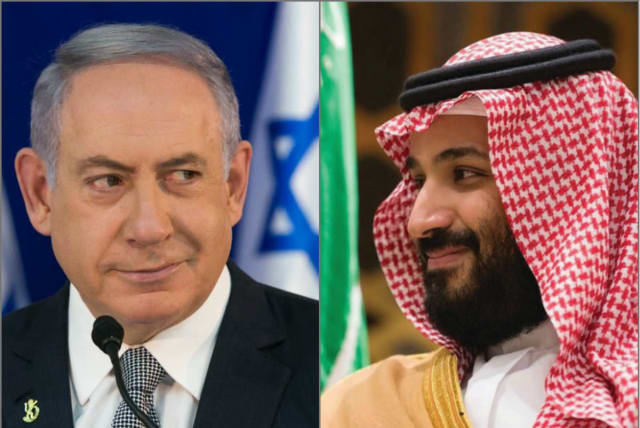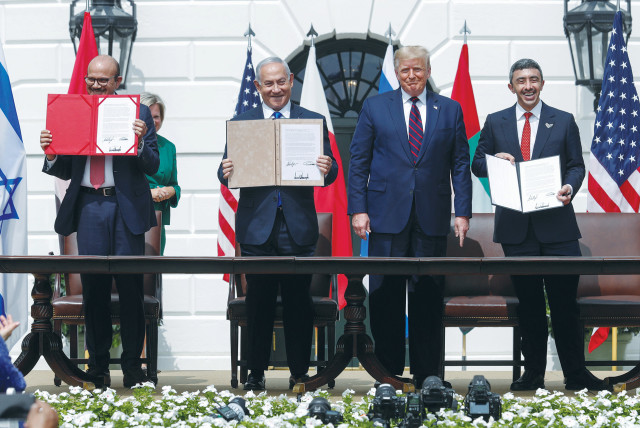The Abraham Accords can be the forerunner for an Israel-Saudi deal - analysis

While the Abraham Accords did not lead to a snowball effect in the Gulf or among other Arab or Islamic nations, it did open the door for the possibility of the Saudis and others walking through.
Suddenly, an Israeli-Saudi Arabia peace deal – as part of a broader US-Saudi agreement – is seemingly on everyone’s mind.
Pick up a newspaper, listen to the radio and television news, and someone somewhere – either a politician or pundit in Washington or Jerusalem – will be discussing the deal’s various aspects, likelihood, and interests of the three parties involved.
Were it not, however, for a historic phone call three years ago on August 13, 2020, between then-US president Donald Trump, Prime Minister Benjamin Netanyahu, and the United Arab Emirates de facto leader Sheikh Mohammed bin Zayed Al Nayan – this time a phone call genuinely worthy of the overused adjective “historic” – it is unlikely anyone would be talking about a possible Israeli-Saudi deal. During that phone call, which followed weeks of intense negotiations, Israel and the UAE agreed to “full normalization of relations.”
This was followed by the announcement some four weeks later of a similar agreement with Bahrain and an official signing ceremony of The Abraham Accords Declaration at the White House on September 20. Two other countries followed suit: Sudan, with whom relations have not progressed significantly because of internal turmoil, and Morocco.
That phone call signaled a sea change in the Mideast by delinking Israel’s relationship with the Arab world from progress on the Palestinian track. It also validated what Netanyahu had been saying for years, but which many – most famously former US secretary of state John Kerry – had said was impossible: normalization with Arab countries even without a comprehensive peace deal with the Palestinians. Even though, as part of the agreement, Israel agreed not to annex large swathes of the West Bank, the Abraham Accords represented a peace-for-peace approach that did not call for Israeli territorial concessions.
Had Bin Zayed not committed to this monumental shift during that Trump-brokered conversation with Netanyahu, then it is hard to imagine that a Saudi-Israeli agreement would be something that anyone would be talking about today.
While the Abraham Accords did not lead, as some had hoped, to a snowball effect in the Gulf or among other Arab or Islamic nations, it did open the door for the possibility – one which is being discussed quite seriously now – of the Saudis and others eventually walking through.
Support for the Abraham Accords in the Gulf is waning
This is one of the legacies of the Abraham Accords and should be kept in mind as they hit their three-year mark amid concern that the initial enthusiasm and excitement are wearing off and support among the involved Arab states is waning.
Despite robust ongoing economic activities between the countries, the popularity of the Abraham Accords has lessened in the Gulf, and skepticism regarding their effectiveness as a model for regional peace has grown.
A Washington Institute for Near East Policy poll in April found that only 20% of Bahrainis and 27% of Emiratis believe that the Abraham Accords will have a “very positive” or “somewhat positive” impact on the Mideast, while 76% of Bahrainis and 69% of Emiratis said the impact will be “somewhat negative” or “very negative.”
Another thing that should be kept in mind at the three-year mark is that the accords have held despite some serious challenges, including three significant Israeli military campaigns in Gaza, one in Jenin, and a hard right-wing government in Jerusalem that is promoting settlement construction and which includes ministers in favor of annexation of parts of Judea and Samaria.
Despite IDF actions in Gaza following Hamas or Palestinian Islamic Jihad rocket attacks and widespread IDF actions in the West Bank to stop terror emanating from there, none of the Abraham Accord countries have indicated re-evaluating the ties.
This isn’t to say that developments on the ground have not cast a pall over the accords to some degree. For instance, Morocco postponed the second “Negev Forum” summit of foreign ministers from Israel, the US, Morocco, Bahrain, the UAE and Egypt that was scheduled for June to protest Israel’s announcement of the approval of plans for some 4,600 new housing units in the settlements and an expedited process to approve settlement building plans.
Another indication of a slower pace in the development of ties is fewer high-profile visits and the fact that Netanyahu, in office now for eight months, has yet to visit any of the Abraham Accord countries. This is to change soon, however, as Morocco’s King Mohammed VI invited him to visit following Netanyahu’s announcement that Israel recognized Morocco’s sovereignty over Western Sahara, and he was also invited, along with President Isaac Herzog, to attend a UN climate change conference in Dubai in early December.
Nevertheless, other aspects of the relationship are thriving. Security ties are intensifying: Israel recently sent a security attaché to Morocco.
Israeli tourism to those countries, especially the UAE and Morocco, is also flourishing. Approximately one-tenth of Israel’s nearly 10 million population has visited the UAE since the Accords’ signing, and last year alone, 200,000 Israelis visited Morocco. Nevertheless, tourism isn’t reciprocal, with only a few thousand tourists from these countries visiting the Jewish state.
Also, almost overnight, the UAE has turned into Israel’s 16th largest trading partner, with the volume of trade reaching $2.6 billion last year and is expected to surpass $3b. this year.
That said, investment in Israel’s economy is not as robust as many anticipated. Soon after the signing of the accords, many thought that UAE and Bahraini investors would readily fund various Israeli hi-tech projects, but they have been more reticent than expected.
Avi Hasson, the CEO of Start-Up Nation, explained recently that this has to do with very different Israeli and Gulf business cultures. While the Israeli business culture is “ya’ala, let’s get this done,” the Gulf investors’ motto is “in’shala, God willing.” Building the relationships to bridge that gap in how things are done takes time, he said.
As the accords enter their fourth year, Israel’s domestic turmoil surrounding judicial reform further complicates relations.
When that three-way phone call was made three years ago, numerous reasons were proffered for why the UAE – and later Bahrain and Morocco – were interested in normalizing ties with Israel, including addressing mutual threats from Iran and garnering favors from the US.
However, these countries’ relationship with Israel was not only a means to another end but rather seen as having value in and of themselves because of Israel’s significant military and economic power.
However, if the fallout from the judicial reform debate includes a military not seen as capable as in the past, and an economy that is not as strong or stable as in previous years, then Israel’s standing in the eyes of these countries will deteriorate, and its value to them will be downgraded.
As Israel marks three years to the Abraham Accords, that, too, should be considered.
Jerusalem Post Store
`; document.getElementById("linkPremium").innerHTML = cont; var divWithLink = document.getElementById("premium-link"); if (divWithLink !== null && divWithLink !== 'undefined') { divWithLink.style.border = "solid 1px #cb0f3e"; divWithLink.style.textAlign = "center"; divWithLink.style.marginBottom = "15px"; divWithLink.style.marginTop = "15px"; divWithLink.style.width = "100%"; divWithLink.style.backgroundColor = "#122952"; divWithLink.style.color = "#ffffff"; divWithLink.style.lineHeight = "1.5"; } } (function (v, i) { });

